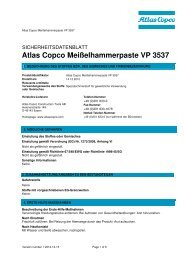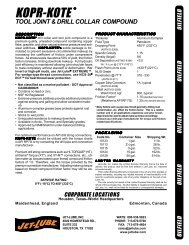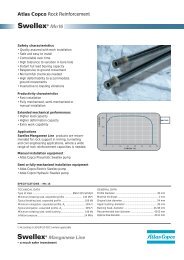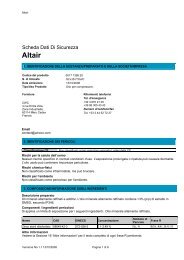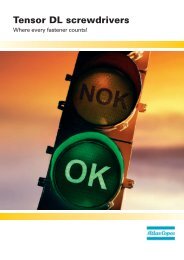LTP 61 Shut-off Nutrunner - Atlas Copco
LTP 61 Shut-off Nutrunner - Atlas Copco
LTP 61 Shut-off Nutrunner - Atlas Copco
Create successful ePaper yourself
Turn your PDF publications into a flip-book with our unique Google optimized e-Paper software.
2<br />
How important is accurate<br />
tightening for your customers?<br />
Some joints are more critical than others. If you need<br />
a higher level of accuracy in your work, take a look at<br />
<strong>Atlas</strong> <strong>Copco</strong>’s shut-<strong>off</strong> nutrunners.<br />
They have become standard pieces of equipment<br />
at truck manufacturers such as Scania and Volvo.<br />
And are becoming more and more common in<br />
service workshops. Why?<br />
The same torque time after time<br />
A shut-<strong>off</strong> nutrunner is a reliable tool. You decide<br />
what torque you want – anything from 60 - 4 000 Nm<br />
depending on the model – and that’s what you get.<br />
No more, no less. Even in soft joints.<br />
And as the name suggests, it shuts <strong>off</strong> at the<br />
torque you have selected. So you get the same accurate<br />
result time after time – regardless of the operator<br />
and their level of experience.<br />
A clear shut-<strong>off</strong> signal tells operators when the<br />
tightening cycle is fi nished. Not only does this<br />
ensure high accuracy, but it also boosts productivity<br />
because the operator can immediately move on to<br />
the next bolt without having to spend time checking<br />
to see if the bolt needs tightening a little more.<br />
First the bad news<br />
A shut-<strong>off</strong> nutrunner gives you reliable tightening<br />
because of the way it builds up torque in a smooth,<br />
controlled and continuous way.<br />
This produces excellent quality in the tightening<br />
phase. However, with a standard shut-<strong>off</strong> nutrunner,




